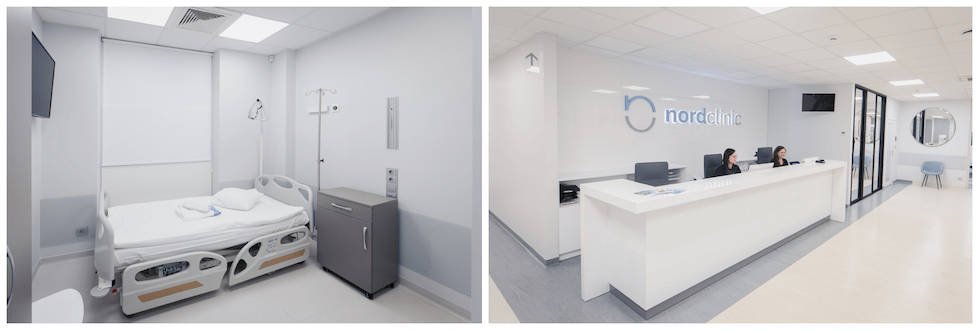Mini Gastric Bypass Abroad: Lithuania
We are one of the leading bariatric surgery clinics for medical tourists in the European Union. We are proud of the fact that over 90 % of our patients come from the UK, Ireland, Norway, Sweden, Denmark, Germany, Switzerland and other countries.
See before-after pictures
Reviews and Facebook group
Our patients and clinic in the media
Prices
- Mini gastric bypass – 6.150 €
- Roux-en-Y gastric bypass – 5.450 £
- Banded gastric bypass – 6.100 £
- Hiatal hernia repaired during weight loss surgery for FREE.
- Plastic surgery after a massive weight loss – from 580 £
Regular consultations with Prof. Almantas Maleckas in London
- accommodation with medical care – from 62 £ per night
- plastic surgeon consultation 12 months after surgery (if interested) – FREE
Regular price:
- consultation with the surgeon and anaesthesiologist
- all the necessary health tests before and after the surgery
- bariatric surgery
- anaesthesia
- hospital stay (1-3 days) with 24 hours medical care
- 24/7 personal assistance during your stay
- transfers to / from the airport, hotel and clinic
- diet instructions after bariatric surgery
- FREE dietician follow-up for 5 years
Get your surgery for free by claiming a refund from your local health board. We cooperate with HSE and other health boards across the EU to help our Irish and EU patients receive a refund for their weight loss surgery in Lithuania. The clinic helps with the documents needed to claim a refund after following the EU directive route for medical treatment abroad.
Please note that the price of the surgery itself is provisional and may be accurately assessed only after the evaluation of each individual case.
The default currency at our clinic is EUR, so if you were looking at prices in GBP it may vary depending on GBP / EUR exchange rate at the moment of payment.
Things to consider when choosing a clinic and surgeon abroad:
- Is it a World-class surgeon with similar experience to ours (700 bariatric surgeries per year) ?
- Is bariatric staff available? We are one of the few clinics that has a specially trained bariatric nursing staff.
- Experience with bariatric anaesthesia? Anaesthesia of overweight patients requires skill and specialised experience, and our anesthesiologists have been specialising in bariatrics for over 15 years.
- What is the quality of the dietitian follow-up services? We offer a 5 year follow-up with a specialised UK-based bariatric dietitian.
- Is it a multidisciplinary private hospital? Nordbariatric is a private clinic with modern facilities and exceptional care.
- Overall knowledge in the field? We have designed a unique bariatric mobile app. Our surgeon is the co-author of more than 40 scientific articles.
All of our patients can use one of our offers available at the moment.
- Additional services in our clinic. You or your accompanying persons can explore the various services by following this link. Customise your preferences and request to book any preferred procedures.
- Brand ambassador discount. If you have a community that would be interested in our services, you can now get a discount for your procedure by spreading the word about our clinic on your social media. Contact your customer service representative for more information.
- Recommendation discount. Get a discount for your next plastic or gynaecology procedure by recommending our clinic. Contact your customer service representative for more information.
- Mini gastric bypass – 6.150 €
- Roux-en-Y gastric bypass – 6.150 €
- Banded gastric bypass – 6.800 €
- Hiatal hernia repaired during weight loss surgery for FREE.
- Plastic surgery after a massive weight loss – from 700 €
Regular consultations with Prof. Almantas Maleckas in London
- accommodation with medical care – from 74 € per night
- plastic surgeon consultation 12 months after surgery (if interested) – FREE
Regular price:
- consultation with the surgeon and anaesthesiologist
- all the necessary health tests before and after the surgery
- bariatric surgery
- anaesthesia
- hospital stay (1-3 days) with 24 hours medical care
- 24/7 personal assistance during your stay
- transfers to / from the airport, hotel and clinic
- diet instructions after bariatric surgery
- FREE dietician follow-up for 5 years
Get your surgery for free by claiming a refund from your local health board. We cooperate with HSE and other health boards across the EU to help our Irish and EU patients receive a refund for their weight loss surgery in Lithuania. The clinic helps with the documents needed to claim a refund after following the EU directive route for medical treatment abroad.
Please note that the price of the surgery itself is provisional and may be accurately assessed only after the evaluation of each individual case.
The default currency at our clinic is EUR, so if you were looking at prices in GBP it may vary depending on GBP / EUR exchange rate at the moment of payment.
Things to consider when choosing a clinic and surgeon abroad:
- Is it a World-class surgeon with similar experience to ours (700 bariatric surgeries per year) ?
- Is bariatric staff available? We are one of the few clinics that has a specially trained bariatric nursing staff.
- Experience with bariatric anaesthesia? Anaesthesia of overweight patients requires skill and specialised experience, and our anesthesiologists have been specialising in bariatrics for over 15 years.
- What is the quality of the dietitian follow-up services? We offer a 5 year follow-up with a specialised UK-based bariatric dietitian.
- Is it a multidisciplinary private hospital? Nordbariatric is a private clinic with modern facilities and exceptional care.
- Overall knowledge in the field? We have designed a unique bariatric mobile app. Our surgeon is the co-author of more than 40 scientific articles.
All of our patients can use one of our offers available at the moment.
- Additional services in our clinic. You or your accompanying persons can explore the various services by following this link. Customise your preferences and request to book any preferred procedures.
- Brand ambassador discount. If you have a community that would be interested in our services, you can now get a discount for your procedure by spreading the word about our clinic on your social media. Contact your customer service representative for more information.
- Recommendation discount. Get a discount for your next plastic or gynaecology procedure by recommending our clinic. Contact your customer service representative for more information.
Patient stories
Only we can offer:
One of the most experienced private bariatric clinic teams in Europe. More than 7.000 bariatric surgeries were performed by our surgeon to this date. A figure that no surgeon or clinic in a region can match.
The only clinic in Europe with a specially designed bariatric mobile app for patients after weight loss surgeries. Available in 6 languages on iOS as well as Android devices.
Watch Peter's gastric bypass story
Refund for EU patients

Get your surgery for free by claiming a refund from your local health board. The clinic helps patients with the documents needed to claim a refund after following the EU directive route for medical treatment abroad. It applies to patients who are insured under the systems of one of the EU countries and may not get the surgery due to long waiting times. On average our patients from the EU countries get fully refunded by their local health board in 3-5 months after their surgeries.
Bariatric Team

- Our surgeon Almantas Maleckas is a doctor of medical science
- UK General Medical Council (GMC) certified
- He performed over 7.000 bariatric operations
- A pioneer in laparoscopic surgery in the region
- More than 15 years working experience in Sweden, Gothenburg University hospital
- Works both in Lithuania and Sweden, speaks fluent English and Swedish
- London School of Economics graduate
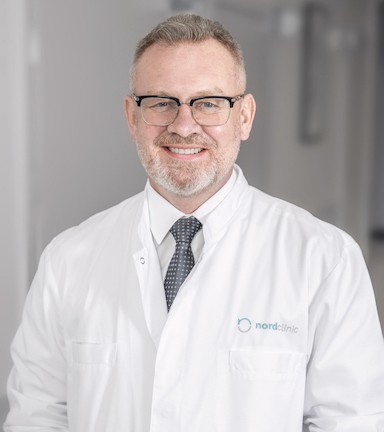
- Our surgeon Nerijus Kaselis is a doctor with a degree in medicine
- Member of the International Federation of Obesity
- Has been practising abdominal surgery for over 32 years, specialising in bariatric surgery for the past 18 years
- Was the first surgeon to perform various laparoscopic surgeries in Lithuania
- Works as a team lead of surgeons in complicated obesity surgeries abroad
- Has international work and study experience
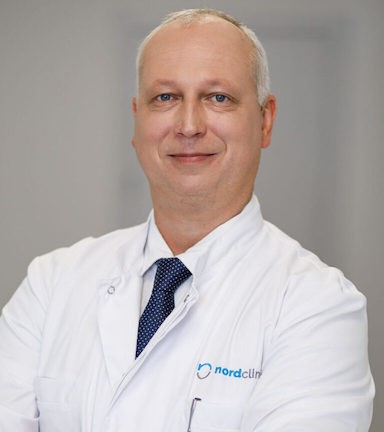
- Our surgeon Linas Venclauskas has over 15 years of experience
- Specialises in minimally invasive surgery, surgical treatment of the upper gastrointestinal tract and bariatric surgery
- Associate Professor at Lithuanian University of Health Sciences
- President of the Kaunas Society of Surgeons
- A member of the European Hernia Society
- Chairman of the Lithuanian Society of Hernia Surgery
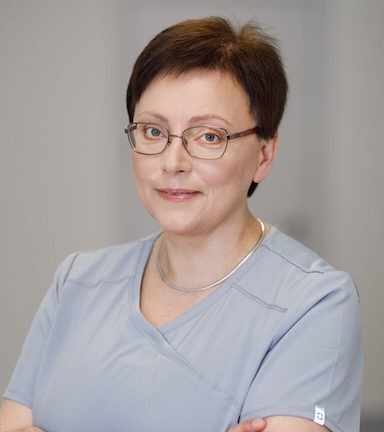
- Our surgeon Aurika Karbonskiene has over 25 years of experience as anesthesiologist
- Over 15 years of experience as a bariatric anesthesiologist
- Since 2008 – Associate Professor at Lithuanian University of Health Sciences
- Board member of Lithuanian Society of Anesthesiologists and Intensive Care Physicians
- Member of the European Society of Anesthesiology
- Researcher and coordinator at the Clinical Trial Network of European Society of Anesthesiology

- Our surgeon Almantas Maleckas is a doctor of medical science
- UK General Medical Council (GMC) certified
- He performed over 7.000 bariatric operations
- A pioneer in laparoscopic surgery in the region
- More than 15 years working experience in Sweden, Gothenburg University hospital
- Works both in Lithuania and Sweden, speaks fluent English and Swedish
- London School of Economics graduate

- Our surgeon Nerijus Kaselis is a doctor with a degree in medicine
- Member of the International Federation of Obesity
- Has been practising abdominal surgery for over 32 years, specialising in bariatric surgery for the past 18 years
- Was the first surgeon to perform various laparoscopic surgeries in Lithuania
- Works as a team lead of surgeons in complicated obesity surgeries abroad
- Has international work and study experience

- Our surgeon Linas Venclauskas has over 15 years of experience
- Specialises in minimally invasive surgery, surgical treatment of the upper gastrointestinal tract and bariatric surgery
- Associate Professor at Lithuanian University of Health Sciences
- President of the Kaunas Society of Surgeons
- A member of the European Hernia Society
- Chairman of the Lithuanian Society of Hernia Surgery

- Our surgeon Aurika Karbonskiene has over 25 years of experience as anesthesiologist
- Over 15 years of experience as a bariatric anesthesiologist
- Since 2008 – Associate Professor at Lithuanian University of Health Sciences
- Board member of Lithuanian Society of Anesthesiologists and Intensive Care Physicians
- Member of the European Society of Anesthesiology
- Researcher and coordinator at the Clinical Trial Network of European Society of Anesthesiology
5-year follow up with dietitian
Nutrition is one of the main focus after weight loss surgery to maximize weight loss and prevent weight gain. We offer a dietitian who will talk with you about the diet you’ll need to follow after surgery, explaining what types of food and how much you can eat at each meal. Karolina is a dietitian and Nutrition Consultant with a degree in the medical field. Read more about her here.
11 reasons that make us the most popular bariatric clinic abroad
Our team of 3 bariatric surgeons has 15-20 years of experience in the field in total performing over 500 different bariatric surgeries per year. Moreover, our surgeons are members of various prestigious surgical societies both Lithuanian and international. Our leading bariatric surgeon Dr Almantas Maleckas has performed more than 7.000 bariatric surgeries. He is fluent in four languages, among which English and Swedish. The surgeon has been regularly working in Sweden for over 15 years. Dr Maleckas is a pioneer of laparoscopic surgery in Eastern Europe and has trained many other bariatric surgeons in the region.
We are one of the leading bariatric surgery clinics for medical tourists in the European Union. We are proud of the fact that over 90 % of our patients come from the UK, Ireland, Norway, Sweden, Denmark, Germany, Switzerland and other countries.
We are trusted by our patients and we appreciate all the reviews and feedback collected over the years. Find testimonials here or on Google.
Already more than 5.000 of our former, current and future patients joined our online community with the aim to build a space for opinions and mutual support. Members are welcome to share experiences about their visit to the clinic and to discuss all surgery-related matters.
We offer a 5-year follow-up which includes being able to get in touch with our Lithuanian dietitian Karolina. She is consulting patients after surgery and is available upon request to answer postoperative nutritional questions for five years after surgery.
Our clinic is the only clinic that has developed its own app designed specifically for bariatric patients – Bariatric IQ. The most useful feature of this app is special bariatric diet recommendations based on a particular product, a patient’s gender, time after surgery and other factors. Such a feature has not been replicated by any other bariatric apps in the world. Read more and download the app on your IOS or Android smartphone here.
Our clinic works according to the highest standards set by the European Union. This helps to guarantee the quality of medical services. We care about the safety, comfort and successful results of our patients from all over the world.
The clinic helps patients with the documents needed to claim a refund after following the EU directive route for medical treatment abroad. It applies to patients who are insured under the systems of one of the EU countries and may not get the surgery due to long waiting times.
We provide customer service in 9 foreign languages including English, Swedish, Norwegian, Danish, Italian, Spanish, French, Russian, Polish. Everyone in our clinic speaks English, including nurses, assistants and the surgeon.
Combining different plastic surgery procedures to offer optimal treatment for post-bariatric patients has been our plastic surgery department’s specialisation for many years now. We have performed such surgeries for more than 10.000 patients to this date. Since weight loss patients often require multiple surgical procedures to address excess skin, surgery planning and surgeons’ experience are very important. We carefully select patients, evaluate each case individually, and only agree to combine surgeries within health & safety limits. Our team of 9 plastic surgeons performs more than 3.000 plastic operations a year, a number that no other clinic in Central & Eastern Europe can match.
Special bariatric app for your mobile phone
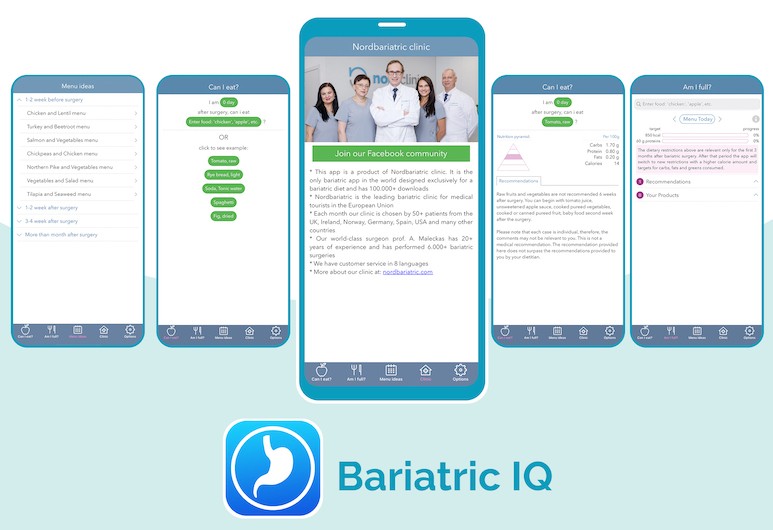
- Created by Nordbariatric clinic
- Special bariatric diet recommendations based on a particular product, a patient’s gender, time after surgery and other factors
- Available in 6 languages
- Available on iOS as well as Android.
- To this date the app was downloaded more than 100.000 times!
- Read more
Our clinic

Self-catered accommodation with medical care
What is a mini bypass surgery and how is it performed?
Mini gastric bypass is also known as a single anastomosis gastric bypass. It is a bariatric surgery which can help to lose as much as 75% of excess body weight. Mini gastric bypass is getting increasingly popular all over the world because of the long term weight loss results and lower complication risk than other bariatric surgeries. Additionally, mini gastric bypass is a reversible procedure which might also be the reason for its popularity.
Mini gastric bypass works by restricting absorption and caloric intake. To achieve that the stomach is divided into two pouches. One pouch is connected to the oesophagus and stores food, while the other one only produces gastric juice. In addition to that, duodenum (the first part of the small intestine) is bypassed by connecting jejunum directly to the new small stomach pouch. This way, 1 to 2 meters of the intestinal tract is bypassed. After the surgery food flows into a tube-like stomach and then into the remaining small intestine for further digestion.
FAQ sessions with our surgeon
Watch full list of interview sessions on our Youtube channel.
How does mini bypass surgery compare to classic gastric bypass surgery? Is it less invasive?
Mini bypass surgery differs from the bypass in that there is only one new junction formed (between the stomach and the small intestine). In a classic gastric bypass not only the stomach is connected directly to the small intestine (bypassing duodenum), but the duodenum itself is cut and reattached to the lower part of the small intestine. In other words, there are two junctions in classic gastric bypass and only one junction in mini gastric bypass.
Even though the mini bypass is called mini, the length of the intestine bypass does not allow it to be called less invasive. It is mainly called mini because it has one junction instead of two, making it a half of the classical bypass.
Mini gastric bypass is advantageous because of shorter operating time and fewer changes in the intestinal route which, subsequently, lowers complication risk.
Moreover, weight loss results are better due to malabsorption of fats and other food components.
When is mini gastric bypass surgery needed?
- Mini gastric bypass is a promising procedure for bariatric patients. Patients usually qualify for bariatric surgery when their body mass index (BMI) is 35 and higher. In the presence of serious health risks patients with BMI of 30-34 can also qualify for a weight loss surgery. Morbid obesity is diagnosed in those patients who have a body mass index (BMI) of 40 or more.
- Excess weight brings a number of serious health issues (high blood pressure, high cholesterol, atherosclerosis, sleep apnea, and type 2 diabetes).
- Without a doubt, obesity also significantly lowers life satisfaction.
Fortunately, it is possible to help bariatric patients lose a significant amount of weight, and thus, increase their quality of life. Thousands of patients have already benefited from long-term success of this bariatric surgery and began a new life chapter.
Book a consultation with our surgeon in London
London consultation in:
Don’t miss a chance to book a consultation with our surgeon prof. Almantas Maleckas in London! Read more
Advantages and disadvantages of a mini gastric bypass
- Mini gastric bypass provides rapid weight loss due to the tight dietary restrictions. Rerouting of the intestines changes intestinal hormone balance, therefore, patients have lower appetite. After the surgery the patient’s body produces less hunger hormones and more satiety hormones, therefore, the patient has a decreased appetite and can feel full for longer.
- Moreover, studies have shown that mini gastric bypass patients are less likely to eat fat and sugar-rich meals for pleasure.
- 96 % of the patients report having resolved life-threatening health issues, such as high blood pressure, severe sleep apnea, type 2 diabetes, and heart disease.
- Unlike a sleeve gastrectomy, mini gastric bypass together with the classical Roux-en-Y bypass is a completely reversible procedure.
- It restricts food options for the rest of one’s life.
- Rerouting of the intestines not only reduces calorie intake but also restricts absorption of various vitamins, thus, the patient has to take essential supplements.
- If dietary recommendations are not followed successfully, the patient can experience gastrointestinal dysfunction. Eating foods rich in sugar and fat can result in dumping syndrome, nausea, vomiting, or diarrhea.
Preparing for the surgery
Starting the preparation process as soon as possible can help save you money, lower complication risk and increase the long term weight loss. A patient can begin preparing for their surgery as early as 1 year before the procedure, so that there is enough time for all the necessary arrangements and initial weight loss.
Firstly, you should schedule a pre-surgery consultation with a general practitioner and find out about any documents (e.g. medical history) you might need. Your family doctor will evaluate your current physical and emotional state of health. Then you should contact the clinic and arrange an initial consultation with your bariatric surgeon. The surgeon will help you choose the best weight loss method and will explain the proposed treatment plan. You will have to undergo pre-surgery tests that will confirm your candidacy.
Once the treatment plan is confirmed, you can start introducing changes to your usual eating habits. Start eating for your health and not for pleasure. No doubt it can be quite challenging to implement healthy eating habits, therefore, you should seek help and advice from a professional dietitian. Losing around 10 % of one’s body weight before the surgery will significantly reduce the complication risk and will make the recovery process much easier and quicker.
Also, you should increase your physical activity by doing something you could tolerate and would enjoy (e.g. walking, swimming).
You should get in the habit of taking multivitamin supplements daily.
Do not drink anything with your meals because after the surgery you will no longer be able to drink any liquids for at least 30 minutes before and after your meal due to a smaller stomach size. Caffeinated drinks will have to be avoided post-surgery. In order to avoid caffeine withdrawal symptoms, patients are recommended to start reducing caffeine intake before their weight loss surgery.
Smoking should be avoided for at least one month before and after the surgery. Bear in mind that the risk of clotting remains high for up to 6 weeks since the last smoked cigarette.
Smoking should be avoided for at least one month before and after the surgery. Bear in mind that the risk of clotting remains high for up to 6 weeks since the last smoked cigarette.
Patients have to undergo several medical tests as part of an accurate medical assessment. It usually includes a blood test, an electrocardiogram and gastrointestinal (GI) endoscopy.
With the surgery day approaching (approximately 4 to 2 weeks before) you will have to stick to a certain diet that will help you lose intra abdominal fat. The main purpose of pre-surgery diet is to shrink fat around the liver so that it is easier for the surgeon to access the stomach. Bear in mind that you must not eat anything for at least 6 hours before the surgery.
Recovery after mini bypass surgery
Right after the surgery it is normal to experience weakness, light-headedness, gas pain, nausea, and vomiting. You are likely to feel pain at the incision sites. You will receive intravenous pain medication for the first few days and as soon as you are able to tolerate fluids you will be given oral pain medication too. You should feel comfortable with asking for pain medication if needed.
Many patients get back up on their feet on the first day after their surgery as it lowers blood-clotting risk and enhances healing. Standing up and doing post-operative exercises will minimize complications and speed up your recovery.
Your follow-up consultation will be scheduled in the next 3 weeks post-surgery. You will get detailed instructions about the wound care and follow-up appointments on the day of your discharge.
When back home, you should give yourself time to rest and recover. You can ask someone to stay with you for the first few days. Most patients take at least 2-3 weeks off work. Avoid sitting and laying down for long periods of time as this can increase clotting risk, however, light activity is highly recommended. Driving may be resumed once you stop taking oral pain medications. Begin walking and gradually increase the distance so that you are able to walk for 45 minutes a day by the sixth week. If you have joint problems you can do water exercises as early as 3 weeks post-op. Avoid lifting heavy objects and doing strenuous activities (e.g. vacuuming) for the first 3 to 6 weeks after surgery. Women who were using oral contraceptive pills might need other types of contraception since the pills may not be fully absorbed after the surgery. However, each case is individual, therefore, female patients should first consult their gynecologist about the further use of contraceptives and their effectiveness.
- During the first week after the surgery your diet will consist only of clear liquids. Coffee, carbonated drinks, and sugar should all be avoided in order to avoid gastric reflux, dumping syndrome, and gas formation.
- On the second week post-op patients can consume more dense liquids (protein shakes, diluted broth, unsweetened milk, sugar-free yoghurt, and sugarless fruit juices).
- On the third week you will be able to eat oatmeal and other pureed foods that are low in fat and sugar. Boiled or cooked eggs, jarred baby food, pureed fish, avocados, mashed bananas can be added to your daily diet by this time. However, fibrous vegetables and fruits should still be avoided as they might not be fully digested.
- 4-6 weeks after the surgery you will be already able to eat solid foods, such as chicken, fish, and non-fibrous vegetables. You should still avoid fibrous fruits, white potatoes, steaks, caffeine, alcohol, and carbonated drinks.
- By the fifth week you can start introducing new products, however, make sure that your meals consist of enough lean protein and vegetables. Bear in mind that weight loss success depends mainly on one’s willingness to stick to the new dietary habits.
Lifestyle changes after mini bypass surgery
Having taken everything into consideration, weight loss surgery results highly depend on how the patient can adhere to the new lifestyle. You will firstly have to commit to good nutrition and follow your eating plan. You will have to adapt to eating smaller portions and notice the difference between emotional eating and real hunger. Weight loss is difficult without exercising. Increasing your physical activity will help to keep the weight off and increase overall life satisfaction. Since bariatric surgery diminishes food absorption, you will have to take nutritional supplements that will prevent vitamin and mineral deficiency. Keep in mind that there are special support groups for bariatric patients where you can find emotional support and learn together with other bariatric patients.
Send us your enquiry






